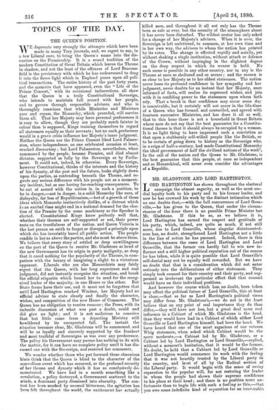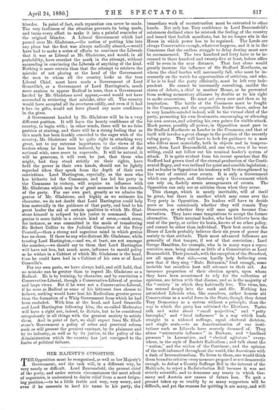MR. GLADSTONE AND LORD HARTINGTON. L ORD HARTINGTON has shown throughout
the electoral campaign the utmost sagacity, as well as the most cor- dial loyalty both to his party and to his former leader, and now he has crowned his work by the distinct intimation which no one doubts that,—with the full concurrence of Lord Gran- ville,—he has given to the Queen, that under the circum- stances of the hour there is no possible Prime Minister but Mr. Gladstone. If this be so, as we believe it is, Lord Hartington has earned the respect and gratitude of his party, which, indeed, are quite as much, if not still more, due to Lord Granville, whose singular disinterested- ness has, no doubt, strengthened Lord Harlington not a little in the line of action he has pursued. Indeed, there is this difference between the cases of Lord Hartington and Lord Granville, that the former can hardly fail to win new in- fluence and a still higher political reputation out of the course he has taken, while it is quite possible that Lord Granville's self-denial may not be equally well rewarded. But we have no doubt that that is a consideration which did not enter seriously into the deliberations of either statesman. They simply took counsel for their country and their party, and sup- pressed as irrelevant the particular effect that that counsel would have on their individual positions.
And however the course which has, no doubt, been taken may affect the political future of Lord Granville, this at least is clear,—that so far as Lord Hartington's political views may differ from Mr. Gladstone's,—we do not in the least believe that on any point of real importance they do thus differ,—they will have not less, but a great deal more real influence in a Cabinet of which Mr. Gladstone is the head, than they would have had in a Cabinet of which either Lord Granville or Lord Hartington himself, had been the head. We have heard that one of the most sagacious of our veteran Whig statesmen, when asked which Cabinet would be the more moderate,—a Cabinet led by Mr. Gladstone, or a Cabinet led by Lord Harlington or Lord Granville,—replied, without a moment's hesitation, that it would be the former. No doubt, he held that a Cabinet led by Lord Granville or Lord Hartington would commence its work with the feeling that it was not heartily trusted by the Liberal party in the country, and least of all by the Radical section of the Liberal party. It would begin with the sense of owing reparation to the popular will, for not restoring the leader in whom the people had shown their supreme confidence to his place at their head ; and there is no position more un- fortunate than to begin life with such a feeling as this,—that you owe some indefinite kind of reparation for an irrevocable blunder. In point of fact, such reparation can never be made. The very faultiness of the situation prevents its being made, and turns every effort to make it into a painful reminder of the original blimder. A Liberal Government which had passed over Mr. Gladstone,-=the notion of putting him into any place but the first was always radically absurd,—would have had to make a series of efforts to convince the Liberals that it was as Liberal as Mr. Gladstone, and would, in all probability, have overshot the mark in the attempt, without succeeding in convincing the Liberals of anything of the kind. Nothing is more certain than that the attempt to retrieve the mistake of not placing at the head of the Government the man to whom all the country looks as the true Liberal Chief, must have made a Government of Lord Granville's, or a Government of Lord Hartington's, much more anxious to appear Radical in tone, than a Government headed by Mr. Gladstone need appear,—and would not have succeeded in retrieving that mistake, after all. The country would have accepted all its overtures coldly, and even if it had taken its gifts, would not have placed any more confidence in the giver. A Government headed by Mr. Gladstone will be in a very different position. It will have the hearty confidence of the country, to begin with ; in other words, there will be no false position at starting, and there will be a strong feeling that as this much has been frankly conceded to the eager wish of the country, Mr. Gladstone will be quite right in attaching very great, not to say extreme importance, to the views of the leaders whom he has been induced, by the evidence of the national wish, once more to supersede. It will be natural, it will be generous, it will even be just, that those who might, had they stood strictly on their rights, have held the power in their own hands, should not be lightly regarded when they speak from the depth of their own convictions. Lord Hartington, especially, as the man who has hitherto led the Commons, and has led his party in the Commons to victory, will acquire an influence with Mr. Gladstone which may be of great moment in the councils of the party. For our own part, greatly as we admire the genius of Mr. Gladstone, and highly as we estimate his character, we do not doubt that Lord Hartington could help him materially in the guidance of that party, and lend to his great leader the aid of certain qualities in which Mr. Glad- stone himself is eclipsed by his junior in command. Great genius is more liable to a certain kind of error,—such error, for instance, as was committed in the mode of transferring Sir Robert Collier to the Judicial Committee of the Privy Council,—than a strong and sagacious mind in which genius has no share. If there be any who distrust Mr. Gladstone, while trusting Lord Hartington,—and we, at least, are not amongst the number,—we should say to them that Lord Hartington will have not less, but much more, influence to mould policy as he wishes in a Cabinet of which Mr. Gladstone is the head, than he could have had in a Cabinet of his own or of Lord Granville's.
For our own parts, we have always held, and still hold, that no mistake can be greater than to regard Mr. Gladstone as a Radical. He is by training, by character, and by conviction a Conservative-Liberal, though a Conservative-Liberal of genius and large views. But if he were not a Conservative-Liberal, if he were as Radical as some of his bitterest foes choose to believe, nothing would have lent his Radicalism greater power than the formation of a Whig Government from which he had been excluded. With him at the head, and Lord Granville and Lord Hartington following him, the so-called Moderates will have a right not, indeed, to dictate, but to be considered scrupulously in all things with the greatest anxiety to satisfy them. And in point of fact, we shall expect from Mr. Glad- stone's Government a policy of sober and practical reform such as will present the greatest contrast, by its plainness and by its industry, as well as by its justice, to the policy of the Administration which the country has just consigned to the limbo of political failures.



































 Previous page
Previous page